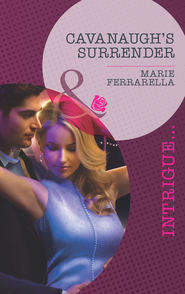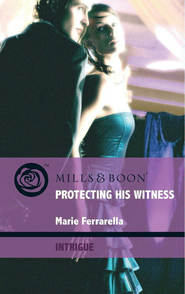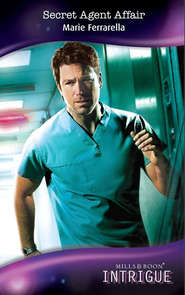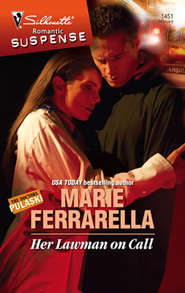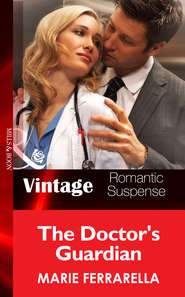По всем вопросам обращайтесь на: info@litportal.ru
(©) 2003-2024.
✖
Taming the Playboy
Автор
Год написания книги
2019
Настройки чтения
Размер шрифта
Высота строк
Поля
There was no more that he could do. The ride to the hospital was fast enough and once there, there would be doctors to see to the man. Besides, he still had a date waiting for him.
Georges began to extricate himself from her. “I—”
Her expression grew more determined. “You said you worked at—Blair Memorial, is it?” Georges nodded. “Then you’re one step ahead of everyone else there. You saw what my grandfather went through. You treated him. Please,” she entreated. “I don’t want to risk losing him. I don’t want to look back and think, If only that doctor had been there, that would have made the difference between my grandfather living and—” She couldn’t bring herself to finish.
It was the sudden shimmer of tears in her eyes that got him. Got him as surely as if handcuffs had been snapped shut on his wrists. Georges inclined his head, acquiescing.
“I never argue with a beautiful damsel in distress,” he told her. Then he glanced up at the frowning Howard who looked like a troll sitting beneath his bridge, protecting his tiny piece of dirt. “Don’t worry, I won’t crowd you in the ambulance,” Georges promised. He jerked his thumb back at his presently less than shiny sports car. “I’ll follow behind in my car.” Georges shifted his glance toward the woman. “That all right with you?”
Vienna Hollenbeck pressed her lips together to hold back the sob that materialized in her throat. She was a hairbreadth away from breaking down, and it bothered her. Bothered her because it clashed with the strong self-image she carried around of herself.
Surprise, you’re not invulnerable after all.
Nodding, Vienna whispered, “Yes, that’ll be fine with me.”
Georges gave her hand a warm squeeze before withdrawing his own. “He’s going to be all right,” he promised.
With a huff, Howard leaned over and shut both doors in his face. Firmly.
Georges turned away and hurried over to his vehicle. Buckling up, he turned the key in the ignition. The car purred to life as if it hadn’t come within inches of being crushed.
He’d just broken cardinal rule number one, Georges thought, waiting for the ambulance to pull away. Not the one about doing no harm. That was the official one on the books, the one that was there to make people feel better about going to doctors. He’d broken the practical one, the one that was intended to have doctors safeguarding their practices and their reputations. The one that strictly forbade them to make promises about a patient’s future unless they were completely, absolutely certain that what they said could be written in stone and that their words couldn’t somehow return to bite them on the part of their anatomy used for sitting.
But he found that he couldn’t look into those blue eyes of hers and not give the woman the assurance that she was silently begging for.
“So I made her feel better for a few minutes,” Georges murmured out loud to no one in particular. “What harm could it do? Really?”
Besides, from what he could ascertain, the old man didn’t look as if he’d sustained extensive bodily injuries.
Appearances can be deceiving.
How many times had he heard that before? How many times had he learned that to be true? The old man could very easily have massive internal injuries that wouldn’t come to light until after he’d been subjected to a battery of tests and scans.
Still, Georges argued silently, why make the woman worry? If there was something wrong, there was plenty of time for the man’s granddaughter to worry later. And if it turned out that there wasn’t anything wrong, why burden her needlessly? He always tried to see things in a positive light. It was an optimism that he had developed over the years and which had its roots in his mother’s lifestyle and philosophy: never assume the worst. If it was there, it would find you soon enough without being summoned.
Georges realized that he was gripping the steering wheel a great deal more tightly than necessary. He consciously relaxed his hold. It didn’t, however, keep him from squeezing through a yellow light in the process of turning red.
He kept pace with the ambulance, all but tailgating it until it reached Blair Memorial.
The hospital was an impressive structure that was perched at the top of a hill and that seemed, according to some, to be forever under construction. Not the main section, which only underwent moderate renovations every ten to fifteen years, but the outlying regions.
Beginning as a small, five-story building, over the last forty-five years, Blair Memorial Hospital, originally called Harris Memorial, had tripled in size. It owed its name change and its mushrooming growth to generous donations from the Blair family, as well as from myriad other benefactors. None of it would have been possible, however, if not for its glowing reputation, attributed to an outstanding staff.
No one was ever turned away from Blair Memorial’s doors and the poorest patient was given the same sort of care as the richest patient: excellent in every way. Its physicians and surgeons thought nothing of volunteering their free time, both at Blair and in outlying regions, rendering services to people who otherwise could not afford to receive the proper medical attention that often meant the difference between life and death, permanent disability and full recovery. Georges was proud to have been accepted at Blair to complete his residency.
The ambulance made a left turn at the light, then an immediate right. Easing around the small space, it backed up to the emergency room’s outer doors.
Georges was right behind it. As he brought his car to a stop beside the vehicle, a volunteer valet came to life behind his small podium and quickly hurried over toward the red sports car.
“I’m sorry, I’ll have to park that for you in the other lot. We need to keep this clear for emergency vehicles.” The words were hardly out of his mouth before he saw the hospital ID that Georges held up for his perusal. The valet flushed. “Oh, sorry, Doctor. I thought you were with them.” He nodded at the ambulance. It wasn’t unusual for family members to accompany ambulances.
“I am,” Georges replied amicably. “There was an accident on PCH. I just happened to be there in time to lend a hand.”
Nodding meekly, the valet faded back to his podium.
The back doors of the ambulance were already opened. Georges waited for the gurney to be lowered. Once it was, he offered his hand to the blonde to help her out of the vehicle.
Her fingers were icy, he noted.
“Thank you,” she murmured, her eyes meeting his and holding for a long moment.
Georges knew the woman wasn’t referring to his helping her out of the ambulance. She was thanking him for coming.
“Part of my job description,” he told her.
“Trolling for patients?” she asked, repeating the words that Nathan had used earlier. She tried to force a smile to her lips.
The small, aborted attempt hinted at just how radiant her smile could be once fully projected. He found himself looking forward to seeing it in earnest.
“Helping where I can,” he corrected.
The gurney was pushed through the electronic doors that had sprung open to admit it and the attendants. Georges placed his hand to the small of her back, guiding her in behind the gurney.
Warm air came rushing at them, a contrast to the cool night air outside. The next moment, the on-duty E.R. physician was coming toward the paramedics and their patient.
“What have we got?” Alex Murphy asked, pulling on plastic gloves as he approached. The next moment, he stopped, looking at Georges in surprise. The two men had crossed paths a couple of hours ago, with Murphy arriving as Georges was leaving.
“Friend of yours, Dr. Armand?” Murphy assumed.
Georges shook his head. “Hit-and-run,” he replied. “Accident happened right behind me on Pacific Coast Highway. Driver of the car never even stopped.” He didn’t add that he had almost been hit by the same driver. Dramatics were his mother’s domain; they’d never interested him. “The man had a cardiac episode. His heart stopped for less than a minute,” he added when Murphy looked at him sharply. “I applied CPR.”
Georges rattled off the rest of the man’s vital signs. When it came to his blood pressure, Georges glanced toward Howard, who supplied the missing piece of information. The paramedic looked annoyed that he had been reduced to the role of a supporting player.
Taking it all in, Murphy nodded. “Okay, we’ll take it from here.”
Georges felt the woman’s eyes on him, as if silently urging him to take the lead. There was no need. Murphy was an excellent physician, but to allay her fears, he turned to the doctor and said, “I’d appreciate it if you did an angiogram on him right away. He has diabetes and a heart condition.”
“And this is a stranger, you say?” Murphy glanced from him to the young woman beside him. And then nodded knowingly. “Angiogram it is.” Murphy turned toward the nurse and orderly who had taken the two paramedics’ places. “You heard Dr. Armand.” They began to wheel the old man away, but Murphy stopped them. “I want a full set of films done, as well.” He fired the names of the specific scans at them. Finished, he backed away.
The nurse and orderly resumed pushing the gurney down the hall, passing through another set of double doors. The blonde began to follow behind them. Hurrying to catch up, Georges placed a restraining hand on her arm.
Startled, she looked at him, a puzzled expression on her face.
“You can’t go there,” he told her, then added with a reassuring smile, “Don’t worry, they’ll bring him back as soon as they’re finished.”
Murphy stripped off the plastic gloves and crossed his arms before him. “Anything else?” he asked, mildly amused.
Georges nodded. He knew how territorial some doctors could be. It was always best to ask permission rather than assume. “If you don’t mind, I’d like to hang around.”






